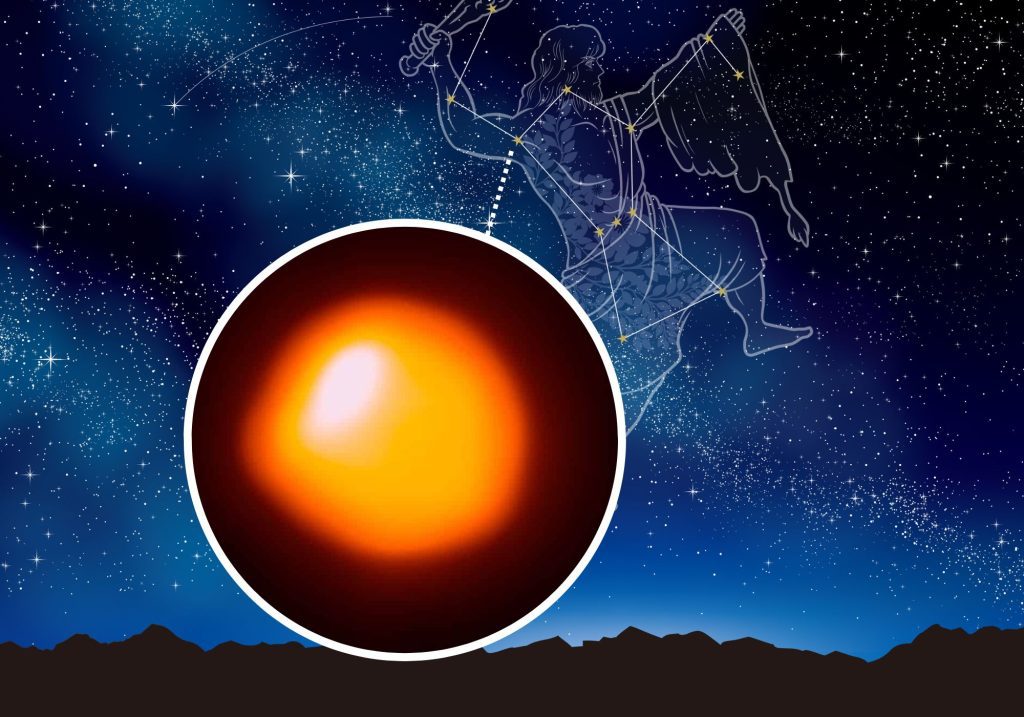On December 12, the famous star Betelgeuse will be briefly hidden from view as it passes behind asteroid 319 Leona.
The red giant Betelgeuse is located about 530 light-years from Earth. This massive star can be easily seen with the naked eye on clear evenings and clearly distinguishes itself from the rest of the stars with its red color. But Betelgeuse will not be seen for a while on December 12, when it disappears behind asteroid 319 Leona in a rare event.
The moment has arrived
“We have waited for years and now the moment has finally come,” she added. Virtual telescope project In the current situation. “On December 12, 2023, the asteroid 319 Leona will pass briefly between us and the star Betelgeuse, eclipsing it. Of course Betelgeuse is a great distance away; This alignment is just a matter of perspective. However, the result will be absolutely amazing.

Backbiting
During the occultation period, Betelgeuse will disappear for a short period of time. Astronomers don’t know exactly how long. This depends on the angular size between this massive star and the asteroid, and these data are not exactly known. However, experts believe that Betelgeuse will only be hidden from our eyes for a few seconds. In addition, the observer’s location on Earth is important, which means that this special event will only be visible from a very narrow strip of our planet.
Preview
The unseen actually gives a glimpse of what awaits us in the distant future. During that moment, we’ll catch a glimpse of the night sky as it will look when Betelgeuse explodes as a supernova and then disappears into the darkness (see box). It is still uncertain when exactly Betelgeuse will explode. Astrologically, this is generally expected to happen in the near future, sometime within the next 100,000 years. Fortunately, the distance to Earth is large enough that we are not directly affected by a supernova explosion. However, future generations on Earth can witness a spectacular fireworks display!
More about Betelgeuse
If there’s one star that has been attracting attention for some time, it’s the red giant star Betelgeuse. The star is about 8 million years old, which is very young (for comparison: our Sun has been around for about 4.5 billion years). Despite its youth, the star is about to die and unleashes a spectacular event: a massive explosion, known as a supernova. At the end of 2019, astronomers believed that the long-awaited moment had arrived. The red giant began to brighten dimly. This stunning drop in brightness, which can be observed even with the naked eye, has sparked excitement and speculation. The question arises: could the star be about to explode? Unfortunately, that turned out not to be the case. Betelgeuse is now back to its usual brilliance; As of April 2020, the star is as bright as it was before the noticeable drop in brightness. Although the star has recovered, astronomers are still keeping a close eye on Betelgeuse.
But the mystery will likely provide other valuable information as well. “Such occultations are particularly useful in revealing the shape of the asteroid in question,” says astrophysicist Gianluca Masi, director of the space center. Virtual telescope project. “In this case, we also hope to explore the surface of Betelgeuse. With 319 Leonas passing in front of it as seen from Earth, we hope to gain more knowledge about the large convection cells on the surface of this massive red giant that are responsible for its variable brightness.”
Southern Italy
Astronomy scientists Virtual telescope project It will travel to southern Italy, one of the locations on Earth where the occultation will be clearly visible. Not only will they be able to admire the rare event from this place, but they will also strive to collect valuable scientific data.
Would you also like to watch? He. She Virtual telescope project The live broadcast will start. The broadcast is scheduled to take place on December 12, 2023, starting at 2:00 AM Netherlands time.

“Coffee buff. Twitter fanatic. Tv practitioner. Social media advocate. Pop culture ninja.”











More Stories
Which can cause an increase in nitrogen.
The Central State Real Estate Agency has no additional space to accommodate Ukrainians.
The oystercatcher, the “unlucky national bird,” is increasingly breeding on rooftops.